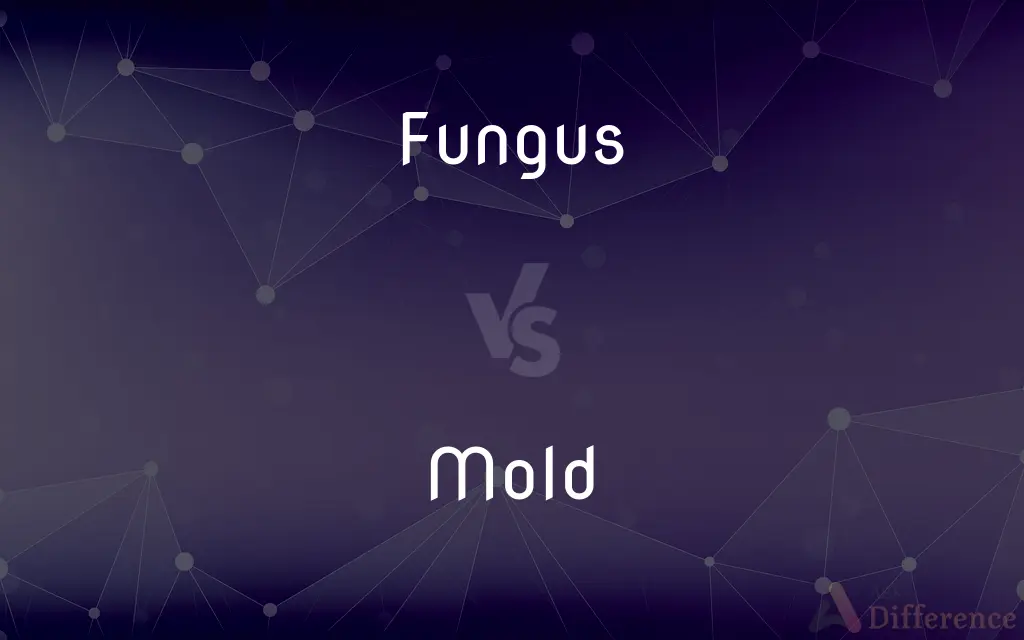Fungus vs. Mold — What's the Difference?
By Tayyaba Rehman & Fiza Rafique — Updated on September 10, 2023
Fungus is a kingdom of spore-producing organisms, while mold is a type of fungus that grows in multicellular filaments.

Difference Between Fungus and Mold
Table of Contents
ADVERTISEMENT
Key Differences
Fungus is a broader term that encompasses a wide range of spore-producing organisms, including mushrooms, yeast, and mold. Mold, on the other hand, is a specific type of fungus that grows in the form of multicellular filaments, known as hyphae.
In scientific taxonomy, fungi have their own kingdom, separate from plants, animals, and several other life forms. Mold is essentially a subgroup within the fungus kingdom, specialized in breaking down decaying matter and growing on surfaces.
In everyday language, the term "fungus" is often used to describe a variety of fungal infections or growths on the body, objects, or food. Mold, however, is most commonly associated with the spoilage of food and the growth of spores in damp or humid areas.
Comparison Chart
Taxonomy
A kingdom
A type within the Fungus kingdom
Growth Form
Various forms, including single-celled and multicellular
Grows in multicellular filaments
ADVERTISEMENT
Common Uses
Bread yeast, medicine, etc.
Cheese, penicillin, etc.
Associations
Infections, food, ecosystems
Food spoilage, indoor growth
Compare with Definitions
Fungus
Fungus is a spore-producing organism that is part of its own kingdom.
Mushrooms are a type of fungus.
Mold
Mold is a type of fungus that grows in multicellular filaments.
Mold covered the forgotten loaf of bread.
Fungus
Fungus can be a single-celled organism.
Yeast, used in baking, is a single-celled fungus.
Mold
Mold thrives in damp conditions.
The basement had a problem with mold due to the humidity.
Fungus
Fungus can grow on organic matter.
The fallen log was covered in fungus.
Mold
Mold is commonly found on decaying food.
I found mold on the old cheese in the fridge.
Fungus
Fungus thrives in moist environments.
Athlete's foot is a fungal infection that loves sweaty shoes.
Mold
Mold can produce allergens and irritants.
Mold in the house can worsen asthma symptoms.
Fungus
A fungus (plural: fungi or funguses) is any member of the group of eukaryotic organisms that includes microorganisms such as yeasts and molds, as well as the more familiar mushrooms. These organisms are classified as a kingdom, separately from the other eukaryotic kingdoms, those being Plantae, Animalia, Protozoa, and Chromista.
Mold
Mold reproduces by releasing spores.
The mold released spores into the air, making it important to clean thoroughly.
Fungus
Any of numerous spore-producing eukaryotic organisms of the kingdom Fungi, which lack chlorophyll and vascular tissue and range in form from a single cell to a mass of branched filamentous hyphae that often produce specialized fruiting bodies. The kingdom includes the yeasts, smuts, rusts, mushrooms, and many molds, excluding the slime molds and the water molds.
Mold
A mold (US) or mould (UK, NZ, AU, ZA, IN, CA, IE) is a fungus that grows in the form of multicellular filaments called hyphae. In contrast, fungi that can adopt a single-celled growth habit are called yeasts.
Fungus
(mycology) Any member of the kingdom Fungi; a eukaryotic organism typically having chitin cell walls but no chlorophyll or plastids. Fungi may be unicellular or multicellular.
Mold
A town in north-eastern Wales, administrative centre of Flintshire; population 10,500 (est. 2009).
Fungus
A spongy, abnormal excrescence, such as excessive granulation tissue formed in a wound.
Mold
A hollow form or matrix for shaping a fluid or plastic substance.
Fungus
Any one of the Fungi, a large and very complex group of thallophytes of low organization, - the molds, mildews, rusts, smuts, mushrooms, toadstools, puff balls, and the allies of each. See fungi.
Mold
A frame or model around or on which something is formed or shaped.
Fungus
A spongy, morbid growth or granulation in animal bodies, as the proud flesh of wounds.
Mold
Something that is made in or shaped on a mold.
Fungus
A parasitic plant lacking chlorophyll and leaves and true stems and roots and reproducing by spores
Mold
The shape or pattern of a mold.
Mold
General shape or form
The oval mold of her face.
Mold
Distinctive character or type
A leader in the mold of her predecessors.
Mold
A fixed or restrictive pattern or form
A method of scientific investigation that broke the mold and led to a new discovery.
Mold
(Architecture) See molding.
Mold
Any of various filamentous fungi that grow on and contribute to the decay of organic matter.
Mold
A growth of such fungi.
Mold
Any of various other saprophytic or parasitic organisms that resemble fungi, such as slime molds or water molds.
Mold
Loose friable soil, rich in humus and fit for planting.
Mold
The earth; the ground.
Mold
The earth of the grave.
Mold
(Archaic) Earth as the substance of the human body.
Mold
To form (something) out of a fluid or plastic material
Molded a cup out of clay.
Mold
To form into a particular shape; give shape to
Molded the clay into a ball.
Mold
To guide or determine the growth or development of; influence
A teacher who helps to mold the minds of his students.
Mold
To fit closely by following the contours of (the body). Used of clothing.
Mold
To assume a certain shape
Shoes that gradually molded to my feet.
Mold
To become moldy.
Mold
A hollow form or matrix for shaping a fluid or plastic substance.
Mold
A frame or model around or on which something is formed or shaped.
Mold
Something that is made in or shaped on a mold.
Mold
The shape or pattern of a mold.
Mold
General shape or form.
The oval mold of her face
Mold
Distinctive character or type.
A leader in the mold of her predecessors
Mold
A fixed or restrictive pattern or form.
His method of scientific investigation broke the mold and led to a new discovery.
Mold
(architecture) A group of moldings.
The arch mold of a porch or doorway;
The pier mold of a Gothic pier, meaning the whole profile, section, or combination of parts
Mold
(anatomy) A fontanelle.
Mold
A natural substance in the form of a woolly or furry growth of tiny fungi that appears when organic material lies for a long time exposed to (usually warm and moist) air.
Mold
A fungus that creates such colored, furry growths.
Mold
Loose friable soil, rich in humus and fit for planting.
Mold
Earth, ground.
Mold
The top or crown of the head.
Mold
(transitive) To shape in or on a mold; to form into a particular shape; to give shape to.
Mold
(transitive) To guide or determine the growth or development of; influence
Mold
(transitive) To fit closely by following the contours of.
Mold
(transitive) To make a mold of or from (molten metal, for example) before casting.
Mold
(transitive) To ornament with moldings.
Mold
(intransitive) To be shaped in or as if in a mold.
These shoes gradually molded to my feet.
Mold
(transitive) To cause to become moldy; to cause mold to grow upon.
Mold
(intransitive) To become moldy; to be covered or filled, in whole or in part, with a mold.
Mold
To cover with mold or soil.
Mold
A spot; a blemish; a mole.
Mold
Crumbling, soft, friable earth; esp., earth containing the remains or constituents of organic matter, and suited to the growth of plants; soil.
Mold
Earthy material; the matter of which anything is formed; composing substance; material.
The etherial mold,Incapable of stain.
Nature formed me of her softest mold.
Mold
A growth of minute fungi of various kinds, esp. those of the great groups Hyphomycetes, and Physomycetes, forming on damp or decaying organic matter.
Mold
The matrix, or cavity, in which anything is shaped, and from which it takes its form; also, the body or mass containing the cavity; as, a sand mold; a jelly mold.
Mold
That on which, or in accordance with which, anything is modeled or formed; anything which serves to regulate the size, form, etc., as the pattern or templet used by a shipbuilder, carpenter, or mason.
The glass of fashion and the mold of form.
Mold
Cast; form; shape; character.
Crowned with an architrave of antique mold.
Mold
A group of moldings; as, the arch mold of a porch or doorway; the pier mold of a Gothic pier, meaning the whole profile, section, or combination of parts.
Mold
A fontanel.
Mold
A frame with a wire cloth bottom, on which the pump is drained to form a sheet, in making paper by hand.
Mold
To cover with mold or soil.
Mold
To cause to become moldy; to cause mold to grow upon.
Mold
To become moldy; to be covered or filled, in whole or in part, with a mold.
Mold
To form into a particular shape; to shape; to model; to fashion.
He forgeth and moldeth metals.
Did I request thee, Maker, from my clayTo mold me man?
Mold
To ornament by molding or carving the material of; as, a molded window jamb.
Mold
To knead; as, to mold dough or bread.
Mold
To form a mold of, as in sand, in which a casting may be made.
Mold
The distinctive form in which a thing is made;
Pottery of this cast was found throughout the region
Mold
Container into which liquid is poured to create a given shape when it hardens
Mold
Loose soil rich in organic matter
Mold
The process of becoming mildewed
Mold
A fungus that produces a superficial growth on various kinds of damp or decaying organic matter
Mold
Sculpture produced by molding
Mold
Form in clay, wax, etc;
Model a head with clay
Mold
Become moldy; spoil due to humidity;
The furniture molded in the old house
Mold
Form by pouring (e.g., wax or hot metal) into a cast or mold;
Cast a bronze sculpture
Mold
Make something, usually for a specific function;
She molded the riceballs carefully
Form cylinders from the dough
Shape a figure
Work the metal into a sword
Mold
Fit tightly, follow the contours of;
The dress molds her beautiful figure
Mold
Shape or influence; give direction to;
Experience often determines ability
Mold public opinion
Common Curiosities
How do fungus and mold differ?
Fungus is a broader term, while mold is a specific type of fungus.
Is all mold a fungus?
Yes, all mold is a type of fungus.
What is fungus?
Fungus is a kingdom of spore-producing organisms.
Can you eat fungus?
Some fungi like mushrooms are edible, while many are not.
What is mold?
Mold is a type of fungus that grows in multicellular filaments.
Where can mold be commonly found?
Mold is commonly found in damp or humid areas.
Can mold cause health problems?
Certain molds can produce allergens and irritants that may cause health issues.
Is mold always harmful?
Some molds are useful in food and medicine, but some can be harmful.
Where can fungus grow?
Fungus can grow in a variety of environments, including soil, water, and organic matter.
Is athlete's foot caused by fungus or mold?
Athlete's foot is caused by a specific type of fungus.
What are common uses for fungus?
Fungus is used in medicine, baking, and brewing.
Can both fungus and mold grow indoors?
Yes, both can grow indoors under the right conditions.
Is yeast a fungus or mold?
Yeast is a type of single-celled fungus.
What are common uses for mold?
Mold is used in food like blue cheese and in producing antibiotics like penicillin.
Share Your Discovery

Previous Comparison
Widow vs. Widowed
Next Comparison
Villainize vs. VilifyAuthor Spotlight
Written by
Tayyaba RehmanTayyaba Rehman is a distinguished writer, currently serving as a primary contributor to askdifference.com. As a researcher in semantics and etymology, Tayyaba's passion for the complexity of languages and their distinctions has found a perfect home on the platform. Tayyaba delves into the intricacies of language, distinguishing between commonly confused words and phrases, thereby providing clarity for readers worldwide.
Co-written by
Fiza RafiqueFiza Rafique is a skilled content writer at AskDifference.com, where she meticulously refines and enhances written pieces. Drawing from her vast editorial expertise, Fiza ensures clarity, accuracy, and precision in every article. Passionate about language, she continually seeks to elevate the quality of content for readers worldwide.















































